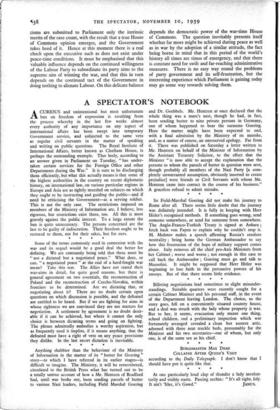A SPECTATOR'S NOTEBOOK
ACURIOUS and unintentional but most unfortunate ban on freedom of expression is resulting from the process whereby in the last few weeks almost every authority of any importance on any aspect of international affairs has been swept into temporary Government service, and subjected to the same veto as regular civil servants in the matter of speaking and writing on public questions. The Royal Institute of International Affairs, better known as Chatham House, is perhaps the outstanding example. That body, according to an answer given in Parliament on Tuesday, " has under- taken certain services for the Foreign Office and other Departments during the War." It is sure to be discharging them efficiently, but what this actually means is that some of the highest authorities in the country on recent diplomatic history, on international law, on various particular regions in Europe and Asia are as tightly muzzled on subjects on which they ought to be instructing and guiding the public—and if need be criticising the Government—as a serving soldier. This is not the only case. The restrictions imposed on members of the Ministry of Information are, I believe, less rigorous, but restrictions exist there, too. All this is most gravely against the public interest. To a large extent the ban is quite unnecessary. The persons concerned are the last to be guilty of indiscretion. Their freedom ought to be restored to them, not for their sakes, but for ours.
* * * *




































 Previous page
Previous page